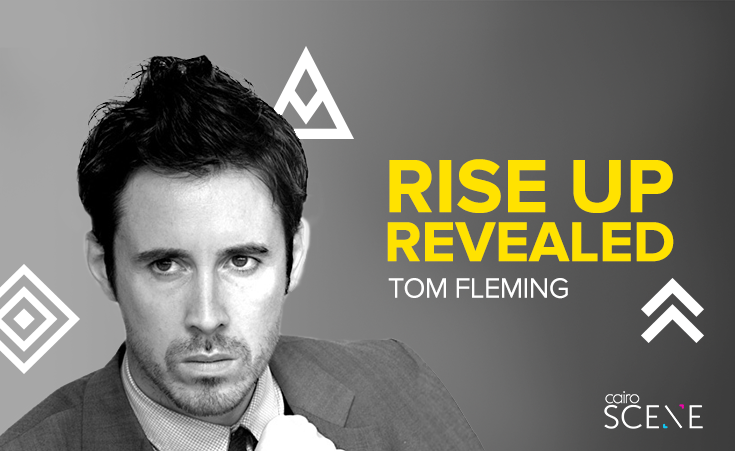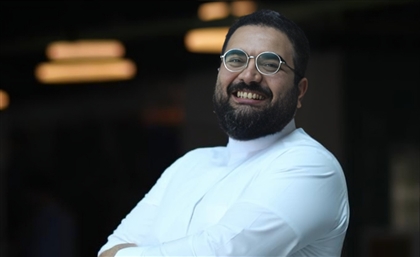How to Make a Business Out of Your Artistic Talent: Meet the Guru of The 'Creative Economy'
In this exclusive interview ahead of the buzzing RiseUp Summit taking over Cairo in December, we meet the UK’s leading consultant for the creative economy, Tom Fleming, to unveil how artists, designers, and gamers across the world are becoming entrepreneurs in their own right.

As RiseUp Summit 2016 gears up to transfigure downtown Cairo into a startup twister once again, its sexiest proposition is perhaps its most ambitious promise: to emulate atomic fusion by bringing together business, tech, and what they call the ‘creative economy'. But in a land of tradition and orthodox parental mandates, is there ground for an upsurge of creatives crafting businesses? Tom Flemming slams any doubt.
“In certain contexts where things can aggregate, the sector is very palpable; in big, big cities like Cairo, industries like media generate lots of visible value and employ lots of people. So numbers can change minds and build appreciation for the sector,” he says.
An academic researcher and an avid diver into the artistic realm, Fleming has explored emerging trends in the creative industry since the 1990s, when he studied at the Manchester Institute of Popular Culture. Having set up his own agency to support creative businesses in East London, he got the opportunity to meet many ‘micro-creatives’, whose aspirations inspired him to create his most ambitious project yet – a platform to enable conditions to support talent as it emerges and help it grow overseas.
His company, Tom Fleming Creative Consultancy, is the UK’s leading international consultancy today, working across 300 cities worldwide with both the public and private sectors, from Singapore’s National Arts Council to the European Union Programme Culture for Cities and Regions and the Caribbean Development Bank.
“We started very small, like most startups, and we built a client base and reputation that led to where we are now. But we were always purposefully international because, living in a very diverse context in East London, we were aware that creative businesses are inherently global, and therefore collaborate across international networks, so that’s what we continue to do,” he says. “Especially today, in the context of countries closing in on themselves, we are more determined than ever to keep building those international relationships.”
From establishing hubs, networks, and digital platforms to investment programmes such as accelerators, incubating programs, and targeted finance initiatives, Fleming focuses on developing effective platforms and tools to help creative industries develop and grow. As he heads off to land in Cairo for an eye-opening talk at RiseUp, the ‘creative economy’ guru gives CairoScene some insights on this promising sector.
How do you foster creative industries in traditional countries like Egypt, where creative careers are often frowned upon and discouraged?
It’s not uncommon to see some jobs given additional status above other jobs, all over the world. I guess we have to be sensitive to that, but we are using evidence and examples on how creative industries are a major part of urban economies, especially the more developed ones. So if you are serious about developing your overall economy, there have to be jobs in that sector.
Ultimately, this barrier is a structural weakness for the overall economy, so you have to work with teachers and parents to win hearts and minds in appreciating the sector. In some countries, there are development agencies to build the profile of the sector and formalize it, because one of the challenges is its informal character in many countries, where it is very hard to make money. But once there is a structure, that is not the case.
How did this awareness - and profitability of those businesses - come about at a global level?
On the one hand, it came from the cultural sector, which was always marginalised. Industries like film or literature were not being valued for their cultural value, let alone their economic value. So there was a movement in the 70s and 80s to support and champion these industries.
But digitally, the terms of reference changed. In northern Europe, and particularly the UK, there was a focus on creative industries such as software and gaming companies, and digitally enabled services. The national government set up a task force, which provided data demonstrating that if you put together a group of sectors that have creativity at their heart, this is bigger than agriculture in aggregate, for example.
Spinning off that, entities such as The World Bank, EU, and UNESCO have undertaken their own studies in the last decades, which have demonstrated not only the size of creative industries but also how they are growing faster than anything else.
Unlike other countries with a public framework for entrepreneurship, the startup ecosystem in Egypt is rather bottom-up. What stories can you share of creative startups in similar environments?
One comparable example would be Beirut, where they had a very bottom-up and tech-driven approach. About seven years ago, they set up a creative cluster driven by a mixture of civil society organizations and high-profile digital businesses. Besides, they had additional support from Cisco systems, which were looking to invest in the country.
This was how they developed a stronger network, a stronger lobbying voice, and an example of how we can develop creative platforms based on knowledge-sharing and skills exchange, as well as attracting stronger relationship with the investment sector.
In Bristol, England, there is something called the ‘pervasive media studio’ which was set up as a pilot for co-working and co-commissioning for micro businesses working in those sectors. The platform is driving innovation across the region and gaining scale, as one of the universities is co-investing in it as a development programme. From that, there are taller trees growing, linked in with major organisations working in the city such as Toshiba and HP. That’s a combination of bottom-up and working with more established businesses to connect.
Do you think the creative and business mindsets are very far apart?
Often these things are delimited. But a lot of creative people are also very entrepreneurial, because they are used to crossing boundaries and exploring opportunities. There are skills gaps in technical things like management, legal, accounting, and sometimes technical; particularly, because a lot of them start very small, so you have to generate that through collaboration. But what is more important is how to nurture relationships across those boundaries rather than expecting individuals to have all those skillsets in-house. That’s why clusters and networks are really important.
I also think that separating the creative and the business, it kind of diminishes the creative, while actually you don’t lead anywhere without the creative. If you create the environment where creative can exploit their ideas instead of trying to foreground them in how they can be channeled into businesses, it grows the sector as well.
Tom Fleming will be at this year's RiseUp Summit; for more information check out their Facebook page here or follow them on Instagram @riseupsummit.
























